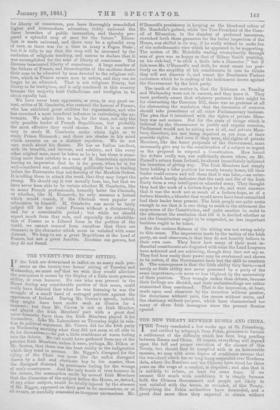THE TWENTY-TWO HOURS' SITTING.
IF the Irish are determined to inflict on us many such pen- ances as the twenty-two hours' sitting of Tuesday and Wednesday, we must saf that we wish they would alleviate the annoyance it causes by the display of a little more genuine ability, or even humour. No one who was present in the House during any considerable portion of that scene, could easily have believed that what ho was listening to was the struggle of a small band of outraged patriots against the oppressors of Ireland. During Mr. Cowen's speech, indeed, they might have been under snch an illusion for a moment ; but then Mr. Cowen is not an Irish Member, and played the Irish Members' part with a great deal more dramatic force than the Irish Members played it for t iemselvee. Like Mr. Labouchere on Thursday night in rola- ti.ni to political argument, Mr. Cowen did for the Irish party on Wednesday morning what they did not seem at all able to do for themselves ;—he put a little semblance of warm feeling into the debate. No one could have gathered from any of the genuine Irish Members, unless it were, perhaps, Mr. Dillon or Mr. Sexton, that there was the least reality in the indignation which they tried to assume. Mr. Biggar's disregard for the ruling of the Chair was more like the sullen disregard shown by a dull and obstinate boy to his master, than the disregard dictated by passionate feeling for the wrongs of one's countrymen. And the only touch of true humour in the debate, the assumption made by several Irish Members that the discussion of the Subject before the House, or, indeed, of any other subject., would be fatally injured by the absence of Mr. Biggar, appeared on their part to be unconscious, or at all events, so carefully concealed as to.appear unconscious. Mr. O'Donnell's persistency in harping on the blood-red colour of Mr. Mundella's gaiters, while the Vice-President of the Coun- cil of Education, in the slumber of profound innocence, stretched forth those garments for the better inspection of the House, was skilful in its way, if he really wished to make fun of the melodramatic view which ho appeared to be supporting. The notion of Mr. Mundella wading triumphantly through seas of gore was as happy as that of Sidney Smith yearning, on his sick-bed, " to stick a knife into a Dissenter ;" but if this were Mr. O'Donnell's real drift, he must count too posi- tively on the stupidity of his constituents, in case he thinks they will not discover it, and resent the Bombastes Furioso caricature which ho is making of the indictment drawn against the Government by the Irish party.
The truth of the matter is, that the Irishmen on Tuesday and Wednesday were not in earnest, and they knew it. They were perfectly aware that whatever pretence there might be for obstructing the Coercion Bill, there was no pretence at all for obstructing the resolution that the discussion of coercion
should take precedence of all other Parliamentary business. The plea that it interfered with the rights of private Mem- bers was not serious. But for the state of things which is believed by the Government to justify and require coercion, Parliament would not be sitting now at all, and private Mem- bers, therefore, are not being deprived as yet oven of their possible rights. And even if they were, the rights of private Members, like the lesser proposals of le Government, must necessarily give way to the consideration of a subject so urgent as the 'proposal to suspend a Constitution. How forced the debate really was, was sufficiently shown when, on Mr. Parnell's return from Ireland, he almost immediately indicated his intention of giving way. The Irish Members had simply been holding a false position for nearly twenty hours, till their leader could return and tell them that it was false,—an enter- prise which hardly indicates that the rank and file of the Irish Party form a very intelligent or educated army. They thought they had the work of a forlorn-hope to do, and were unaware that it was the work not so much of a forlorn-hope, as of a forlorn blunder, a blunder that would never have been committed had their leader been present. The Irish people are quite acute enough to see that it is one thing to resist to the uttermost the suspension of the Constitution, and quite another to resist to the uttermost the resolution that till it is decided whether or not the Constitution ought to be suspended, no less important business ought to be taken.
But the curious flatness of the sitting was not owing solely to this cause. The impression made by the tactics of the Irish
party, on cool observers, is that they do not heartily believe in their own case. They know how many of their most in- fluential constituents arc disgusted with what the Land Leaguers have achieved and are achieving, though they dare not say so. They feel how easily their power may be overturned and shown to bo rotten, if the Government have but the skill to overturn it, The consequence is that the little ability they have,—and. surely so little ability was never possessed by a party of the same importance,—is more or less blighted by the uncertainty
of their position. They wrangle rather than debate, because their feelings are divided, and their understandings are rather committed than convinced. That is the impression, at least, made upon cool observers by the invective without passion, the dreariness without pain, the sneers without scorn, and the obstinacy without purpose, which have characterised too many of these Irish harangues since the present Session opened.






































 Previous page
Previous page